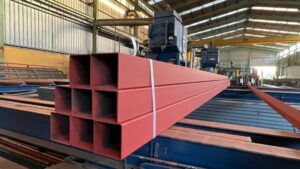Researchers at the UK’s Steel and Metals Institute at Swansea University and the Materials Processing Institute in Middlesbrough are working with global metals and mining companies to develop a process to use hydrogen as a fuel for steelmaking furnaces to cut emissions.
Swansea University said Feb. 9 that the researchers had been using technology based at the Steel and Metals Institute to examine how materials behaved when using hydrogen reduction to remove oxygen from a material.
“If switching to hydrogen from fossil fuels proves feasible, it would slash the carbon emissions from steelmaking,” the university said.
The technology, called a reducibility rig, simulates what happens to materials at very high temperatures in gas-laden environments, it said, which would provide an accurate picture of how hydrogen and other materials behave in the furnace as a first step towards piloting a new type of hydrogen-fueled process.
The work had tested how the technology could work, before the next phase of the project began, Steel and Metals Institute Facilities Manager Mike Dowd said, adding that the reducibility rig had provided a virtual look at how the hydrogen reduction process could work on an industrial scale.
“It means we get a full picture of how materials behave in extreme conditions,” he said, adding that the researchers could also compare hydrogen with carbon-heavy fuel sources.
“With investment, the new hydrogen furnace technology could replace the need for blast furnaces altogether,” Dowd said.
He added that the tools used and the team’s links with industry meant the project could scale up these technologies for commercial use quite quickly.
“This is crucial as we all know that time is of the essence in the drive to cut carbon emissions,” he said.
Currently, iron is reduced in the furnace using carbon monoxide from coke, which attracts the oxygen from the iron ore, but emits large volumes of CO2.
The university noted that 6% of global carbon emissions come from the ironmaking process alone and a single blast furnace produced 5 million mt/year of carbon.
The project is being funded by the UK Department for Business, Energy and Industrial Strategy’s Industrial Fuel Switching Program.
Platts, part of S&P Global Commodity Insights, assessed the weekly UK hot-rolled coil price at GBP730/mt ($883.69/mt) DDP West Midlands Feb. 9, up 18% since the start of 2023.
— Jacqueline Holman






